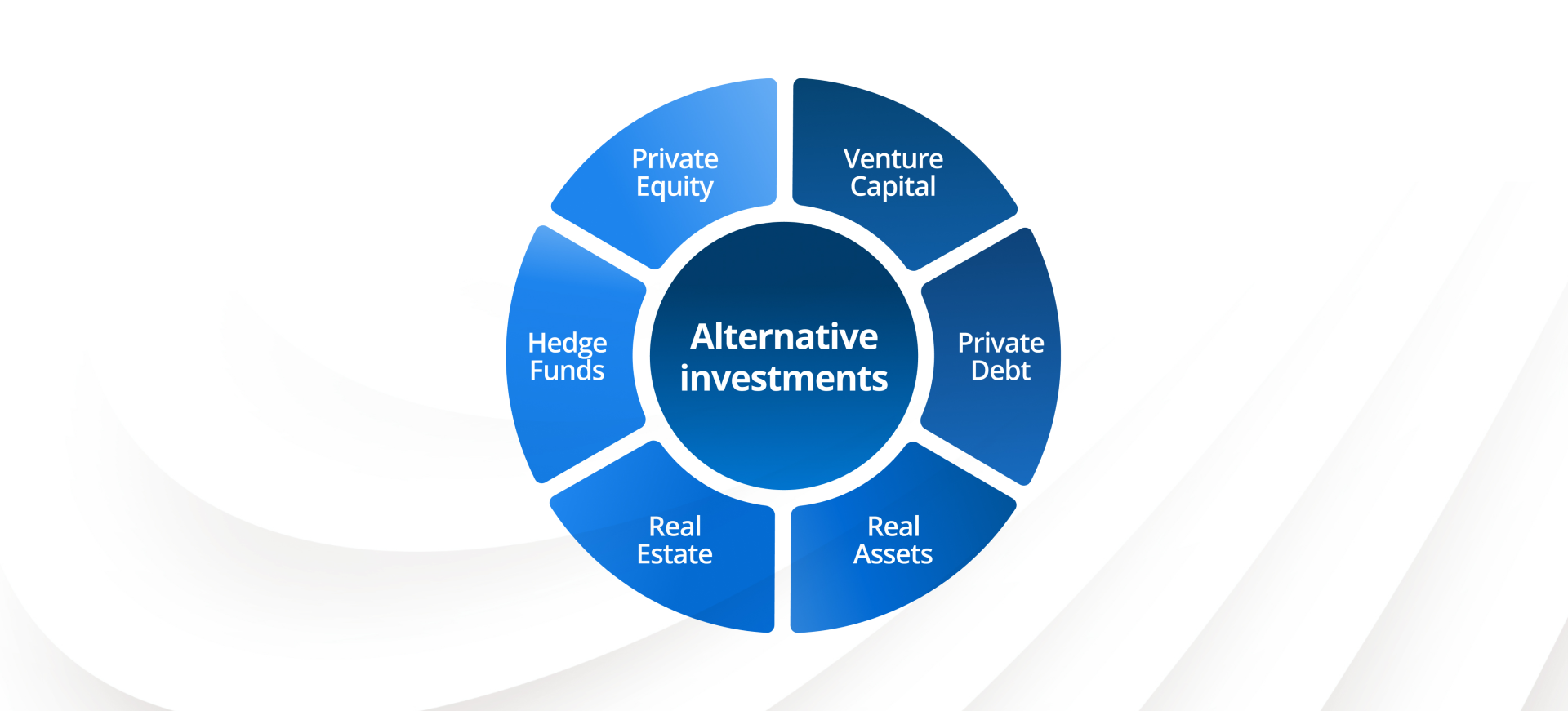Alternative investments explained
A complete guide to alternative investments
Alternative investments definition: An alternative investment is a financial asset that does not belong to the traditional equity, income, or cash category.
Alternative investment options: There is a lot of diversity among alternative investments, meaning that they not only include alternative funds but also private equity, hedge funds, real estate, cryptocurrency, and more.
Advantages and disadvantages: An alternative asset can offer potential for high returns, as well as offering diversification benefits and protection against inflation. Alternative investments may not be suitable for novice investors as they carry a high level of risk.

What are alternative investments?
Alternative investments are financial assets that do not belong to one of the traditional asset classes, such as cash, bonds, or stocks. An alternative investment differs from conventional investment types because it cannot usually be sold easily or converted into cash, making it illiquid. It can be difficult to define alternative investments because there are many different alternative investment options, including private equity, real estate, hedge funds, and venture capital. Alternative investments form a central part of the investment pyramid.
Alternative investments are also commonly known as alternative assets. An alternative asset is generally more lightly regulated by the U.S. Securities and Exchange Commission (SEC) compared to a traditional investment. Originally aimed at accredited or institutional investors, alternative assets are nowadays used by retail investors and alternative investment funds. An alternative asset doesn’t always follow the ups and downs of the stock market, meaning it often moves differently to traditional asset classes.
What are different types of alternative investments?
As a dynamic asset class, there are a multitude of alternative investment types. Alternative investment options can include alternative investment funds or real assets. Alternative investments share the key traits mentioned, but are generally considered one of the asset classes with a wide range of investment possibilities — each with unique characteristics.

Private equity is an alternative asset, as is venture capital, since it is a part of private equity. Private debt, hedge funds, and real assets such as collectibles, real property, and commodities also count among the alternative investment options. Finally, there are structured products and cryptocurrencies. Depending on the specific type of alternative investment, the tax rules applying to alternative investments can differ from those belonging to traditional asset classes.
Private equity
Private equity is an alternative asset that refers to capital investment made into a private company or one that is not listed on a public market like the New York Stock Exchange. This refined branch of stock investments can be divided into 3 subclasses:
- Venture capital: Focuses on early-stage ventures and start-ups.
- Growth capital: Aims for more established companies with restructure or expansion.
- Buyouts: This is the outright purchase of a company or one of its divisions.
Private debt
Private debt is an alternative investment that is neither traded on an open market nor financed by banks (for example, through a bank loan). This alternative asset puts its focus on the instrument used to invest, rather than the borrower. Both private and public companies as well as individuals can borrow via private debt.
Usually, private debt is leveraged if a company needs additional capital for business growth or an individual needs a loan. Companies that act as investors are called private debt funds, whereas individual investors often use online platforms specialized in peer-to-peer lending. Investing in private debt as an alternative asset might pay off in two ways, although it can be risky:
- Through interest payments on the
- Through the repayment of the initial loan.
Hedge funds
Hedge funds are an exclusive type of alternative investment. They are typically only available to institutional investors like mutual and pension funds, endowments, and individuals with liquid financial assets above a certain (high) threshold. A hedge fund is an alternative investment fund that employs a variety of investing strategies while trading relatively liquid assets.
The goal of this alternative asset is to earn a high return on the investment. Hedge funds are traditionally managed by hedge fund managers, who can specialize in quite a few skills to execute their strategy, including long-short equity and market neutrality.
Structured products
Structured products are alternative investments that are relatively new to the investing landscape compared to other more traditional alternative assets. They are often offered by investment banks for organizations, hedge funds, or retail investors.
As an alternative investment, structured products offer investors a mix of products customized to meet their individual needs. Some people perceive structured products as riskier and more complex alternative assets. Usually, structured products involve fixed income markets and derivatives, as well as securities whose value can be traced back to underlying assets such as market indices, stocks, or bonds.
Real assets
Alternative investments in the form of real assets can be divided into commodities, collectibles, and real estate. The latter will be covered in the next section, because it is also one of the world’s biggest asset classes.
- Commodities are tangible goods that have real uses in the physical world, such as raw materials and natural resources. Generally, the investor’s profit is linked to the supply and demand of commodities. Overall, they are considered a relatively stable type of alternative investment that can potentially hedge against inflation.
- Collectibles are an alternative asset that requires investors to purchase and maintain a physical item in the hope that its value increases over time. These assets can be interesting for investors looking for how to build generational wealth, but collectibles investments require a lot of experience to counteract risks, which can include depreciation of the asset, potential destruction of the asset, and lack of income until the asset is sold.
Real estate
Real estate as a category is quite similar to bonds and equity in terms of its characteristics. In addition to investing in real estate securities and physical properties, real estate as an alternative investment has more diversification to offer:
- Real estate investment trusts (REITs)
- Real estate mutual funds
- Real estate crowdfunding platforms
Real estate owners can receive income from tenants paying rent, while aiming to increase the long-term value of the alternative asset. Most investors strive for a combination of capital appreciation of tangible assets and operating income to profit from a stable, ongoing cash flow. Much like with other real assets, valuation is crucial in real estate investing.
Cryptocurrencies
Away from traditional alternative investments, cryptocurrencies are also considered an alternative asset. Some investors include them in their financial portfolio alongside the more conventional assets, like bonds and stocks. Cryptocurrencies can be highly volatile and come with a risk of loss of principal, but they also offer the potential of generating a passive income or capital appreciation.
What are examples of alternative investments?
While alternative investments come in many forms, an alternative asset can also be a mixture of different asset classes. This is the case, for example, with farmland, which is a combination of real estate and commodities. Investors not only have the potential to generate income from operations and sales of goods, but also from reaping the physical, tangible benefits of the farmland.
Traditional commodities are often raw materials and other tangible goods. This could include:
- Agricultural products
- Gold
- Silver
- Oil
Collectibles, on the other hand, are a way to potentially combine a hobby with investments. As an alternative asset, they are multifaceted and usually either have historical value already or develop this value over time. Collectibles include:
- Sports memorabilia
- Art
- High-end watches
- Entertainment memorabilia
Advantages and disadvantages of alternative investments
Alternative investments have many advantages but also some disadvantages. These might vary according to the needs and requirements of each individual investor, as everyone has a unique financial portfolio, investment capital, risk tolerance, and long-term income goals. An alternative investment can have one or more of the following pros and cons.
Advantages | Disadvantage |
|---|---|
Potential diversification benefits | Higher fees and transaction costs |
Protection against inflation | Can sometimes be riskier than traditional investments |
Higher return potential than traditional investments | Potentially illiquid |
Specialty investment options | Reduced regulation and lack of transparency |
Could provide stable long-term income | Typically intended for experienced investors |
Advantages
An alternative asset is quite different to traditional investments or markets. Investing in an alternative asset is often used as a way of diversifying a portfolio to reduce the overall portfolio risk. Compared to traditional investments, alternative investments may offer the potential for higher returns. Since an alternative investment is variable in terms of structure and form, it also offers investors a lot of flexibility. And because alternative assets are often outside traditional markets, their lower liquidity can sometimes provide greater price stability.
Disadvantages
Due to their limited accessibility, alternative investments might be subject to higher expenses or fees compared to a traditional investment. Investors may not be able to easily sell an alternative asset to generate income. An alternative investment is usually not traded on a public market, making it more difficult to obtain relevant market data. What’s more, alternative assets are sometimes less regulated and tend to be more complex than traditional investments.
How to invest in an alternative investment
Investing in alternative investments differs depending on the alternative asset that has been chosen. While some may require extensive research and capital, others can be invested in at the click of a button. The way to invest depends on your chosen asset:
- Private equity usually involves investing a private equity fund, which uses pooled capital to purchase shares in a private company or group of companies.
- Investing in real estate can be done by, for example, buying rental property or investing in real estate investment trusts (REITs).
- Commodities are bought as physical assets or through commodity trading platforms, mutual funds, or exchange-traded funds (ETFs).
- Investing in collectibles or art requires investors to purchase the assets via art dealers, auction houses or online marketplaces.
- Investors with substantial investment capital and high net worth can invest in hedge funds via brokers or hedge fund managers.
- Cryptocurrencies are generally sold on online platforms, through brokers, and through cryptocurrency exchanges. Oftentimes, this requires investors to deposit domestic currency in a digital wallet.
Experts often suggest diversifying your portfolio and choosing asset classes that fit your investment needs. Talking to a financial advisor and tax advisor before investing in alternative assets may help in this process.
Grow your funds in a high-yield savings account
If you want to diversify your portfolio away from investing, Raisin offers access to money market accounts, high-yield savings accounts, and CD accounts to suit every need. Simply select a savings product, create your Raisin login, and deposit your money. After that, sit back and watch your savings grow!
The above article is intended to provide generalized financial information designed to educate a broad segment of the public; it does not give personalized tax, investment, legal, or other business and professional advice. Before taking any action, you should always seek the assistance of a professional who knows your particular situation for advice on taxes, your investments, the law, or any other business and professional matters that affect you and/or your business.


